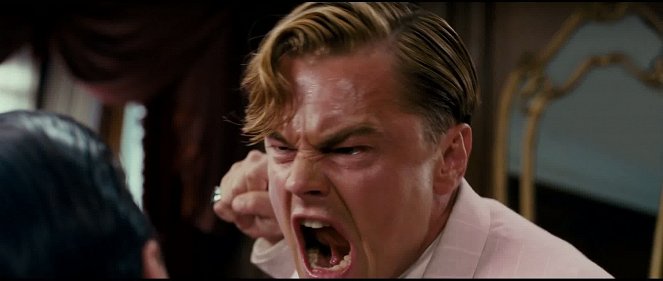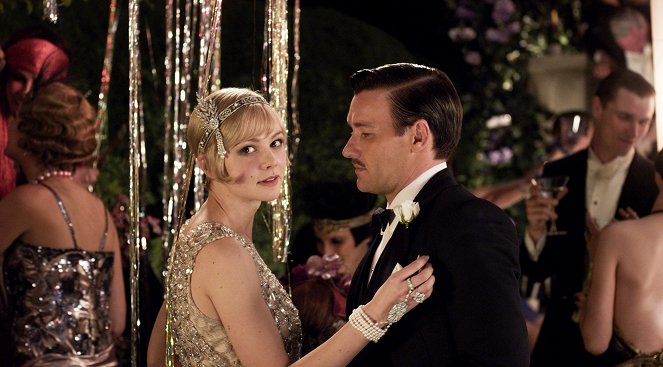Directed by:
Baz LuhrmannCinematography:
Simon DugganComposer:
Craig ArmstrongCast:
Leonardo DiCaprio, Tobey Maguire, Carey Mulligan, Joel Edgerton, Isla Fisher, Jason Clarke, Elizabeth Debicki, Jack Thompson, Amitabh Bachchan, Gemma Ward (more)VOD (3)
Plots(1)
Set in the 1920s, the story follows aspiring writer Nick Carraway (Maguire) as he moves to New York and becomes intrigued by his neighbour Jay Gatsby (DiCaprio)'s lavish lifestyle and mysterious past. As Nick finds himself caught up in the world of the wealthy, he witnesses romantic entanglement and betrayal. Gatsby's true nature is slowly exposed and his involvement with old flame Daisy Buchanan (Mulligan) ultimately leads to tragedy. (Warner Bros. UK)
(more)Videos (28)
Reviews (15)
The more problematic the film, the more you expect a standard adaptation of a classic book. The world of New York high society simultaneously disgusts and attracts Nick. He is aware of his ambivalent position as a person both on the inside and on the outside, a person who simultaneously wants and doesn’t want to be part of the story being told, and he is not only able to reflect that position, but he has to reflect it in his own interest. The narrator’s deeply personal relationship to “his” story and to the characters is emphasised by the fact that for Nick, retrospectively reconstructing who Gatsby actually was is a form of psychotherapy (similarly to the way that the search for the meaning of the word “rosebud” was an attempt to find the truth in Citizen Kane). Given the obvious hints that Nick is Fitzgerald’s alter-ego, writing (or rather retelling) as a form of therapy becomes one of the key motifs of the film. Also, the storyline involving the relationship between Nick and Gatsby (which strikingly lends itself to a queer reading) is ultimately the most authentic aspect of the film and, together with the therapeutic level of the narrative, rationalises the film’s double ending. ___ Like the narrator, Luhrmann sympathises with the characters, yet he places them in the surreal Technicolor world of major studio films, thus turning them into mere abstract ideas. In this rendering, Gatsby is merely the essence of the American mentality (the tenacious, self-destructive effort to achieve a particular ideal) and DiCaprio plays him accordingly. ___ Highlighting the narrative framework in comparison with the book (in which Nick simply tells the story, and why and to whom he is telling it are not important) is not a gratuitous attempt to bring a bit of tabloid subtext into the story – it rhythmises the narrative (“stepping out” of the story occurs at regular intervals) and influences its style. At the beginning, Nick speaks rapidly, as he is fascinated by all of the new stimuli and feels the need to quickly express all of his impressions. The cuts are abrupt and unexpected, and the shots are so short that it is difficult to find one’s bearings in them (it almost seems that there is a separate shot for every sentence). The camera never stops moving and, more so than later in the film, Luhrmann uses lap dissolves to create the impression that one shot blends into the next. The images sparkle, dazzling us with intense colours and CGI effects. We later become aware of the significance of the Sirk-like excessive work with colours, when it becomes clear why Myrtle was characterised in red and Gatsby in blue, or why it is important to know what colour Gatsby’s car is. The soundtrack is just as boisterous as the visual component of the narrative. ___ The choice of songs is the most striking (or rather loudest) link between today and the period in which the narrative is set. The soundtrack’s producers succeeded in selecting songs that can be imagined as contemporary alternatives to the music that was popular in the Roaring Twenties, though there is again a certain exaggeration (the shot of a car full of black people is accompanied by gritty gangsta rap). With its genre diversity, the soundtrack serves as an effective way to map the changes in mood that the film undergoes. ___ The film settles into a calmer, more classic style only after Nick’s story stabilises and focuses on Jay Gatsby as a man who personifies the limits of the American desire for success. The shots are longer, the narrator’s vocabulary is more colourful (which is also connected to the fact that Nick starts typing instead of speaking) and the lighting of the scenes is more natural. Together with the slowing of the film’s pace, the primary sources of inspiration also change. Whereas the noisy and flamboyant first third takes inspiration from the musicals of Busby Berkeley (and, I would venture to say, from the extravagant French epic productions of Marcel L’Herbier and other poetic realists), the film gradually progresses through excursions into gangster, adventure and war movie to a combination of social drama (The Crowd) and melodrama. Due to the doubling of the romantic storyline, however, it is rather an ironic commentary on the genre of melodrama (a sign that Luhrmann was not entirely serious is the pool shot in the film’s climax, which makes reference to the opening minutes of one of Hollywood’s most biting satires). ___ Because of the lifeless characters and excessive care taken to ensure that viewers understand exactly what is happening in the story, The Great Gatsby is an emotionally apathetic and laughably simple film. However, it is not a nonconceptual patchwork for lovers of pretty, shiny objects and expensive champagne (of one particular brand), though it does at first deceptively seem to be just that, even more so than Luhrmann’s earlier attempts to make the past present. 80%
()
(less)
(more)
I don’t like the beginning. The cursory, while strangely long-winded introduction to the atmosphere of the time (full of image fade-ins and fade-outs and fragments of conversations), along with Tobey Maguire as the narrator, which didn’t please me much. At the moment that Gatsby shows up, the tempo relaxes and we get to the main plot. Personally, I made sure that I didn’t find out much before seeing the movie, because as someone who hasn’t read the book (which I now intend to get my hands on) I didn’t have a clue who Jay was. There are about as many parties in the movie as in the trailers, but most important are the very intellectual sounding dialogs or monologs about people in general. The outcome is momentous and I expect (and hope) that Fitzgerald delivered it similarly intensely. Baz Luhrmann this time didn’t really succeed in presenting the period differences between the illustrated and the contemporary (represented by modern music and references to contemporary life) and mainly failed to emphasis the social aspects of the story. All of the romance was first-class. The same as the after-effect. In terms of acting, DiCaprio is outstanding, but his co-stars put on a damn good performance too. Armstrong’s music is captivating, so I hope it’ll be in the soundtrack. Right, old sport?
()
The time arc of 1922/1929 (or richer, as the flashbacks chart Gatsby's entire life) did not disappoint. That's what I call a film that I experience inwardly. A formal and dramatic orgasm. The overall production design alone is perfection (this isn't just any 1920s movie, this is the exact 1920s that I live for). ___ The flawless soundtrack has me undulating to "Young and Beautiful" (Lana del Rey), "Love is Blindness" (Jack White), and the searing "Bang Bang" (Will.i.am).
()
The make-up and lighting make Gatsby look like a leaked Madame Tussaud model. Luhrmann's lust for the most effective imagery neuters the sketches of everyone else, making The Great Gatsby the most poorly narrated (and subjectively longest) blockbuster of the season; a good party ends without a hangover, but here you're dragged to the sidelines with a queasy stomach before its climax.
()
Two and a half stars for the soundtrack, which is not even properly used. The film itself didn’t do for me, but I will give it another chance after some time. The first time I watched it, it irritated me in a similar way as the beginning of Moulin Rouge! … But whereas Moulin Rouge got better as the story progressed, Gatsby irritated me throughout. Maybe next time.
()


